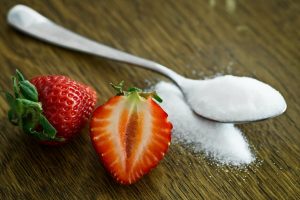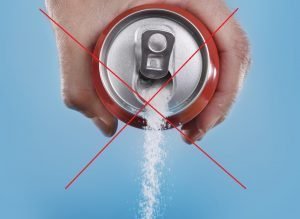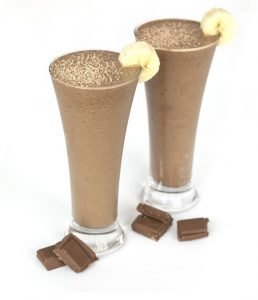It’s official! Organizations and governments are (finally) declaring a maximum amount of daily sugar intake.
While this is a step forward, there are still a few problems. One – they don’t all agree with each other. And, two, I don’t necessarily agree with them either.
We all know sugar is NOT a health food. It isn’t full of nutrition, and excess consumption is not associated with great health.
The problem is that sugar is everywhere. It’s naturally occurring. It’s also added to just about every processed food there is. And this “added sugar” is a factor in many chronic diseases we see today. Sugar is inflammatory. Too much is associated with weight gain, diabetes, heart disease, cancer, and cavities. Too much sugar is a huge health risk, no matter how you look at it.
So let’s talk about how much sugar is “too much.”
Added sugar vs. naturally occurring sugar. What do some of the officials say?

Before we talk about the “official” numbers (and why I don’t agree with them), you need to know the difference between “added” sugar and “naturally occurring” sugar.
Fruit and other healthy whole foods contain sugar. They also contain water, fiber, vitamins, minerals, and other phytochemicals. They are good for you. Eating fruits and vegetables is a well-proven way to reduce your risks of many chronic diseases.
“Added sugars,” on the other hand, are concerning. A large number of deaths each year are due to sweetened beverages. “Added sugars” are also in baked goods, candies, soups, sauces and other processed foods. You can find sugar on the ingredient list as many names, often ending in “-ose.” These include glucose, fructose, sucrose, etc.
So, “Total sugars” = “Naturally occurring sugars” + “Added sugars.”
Tips to reduce your sugar intake

First, I’d ditch as many processed food as possible, regardless of their sugar content. There are a ton of studies that show that processed foods are bad for your health. Period. I wouldn’t recommend eating your “daily value” of sugar from sweetened processed foods. I don’t recommend even 50 g of “added” sugar per day. Get your sugar from whole, unprocessed fruits first.
Here are some of my most popular recommendations to reduce your sugar intake, so you don’t get too much:
- Reduce (or eliminate) sugar-sweetened beverages; this includes soda pop/soft drink, sweetened coffee/tea, sports drinks, etc. Instead, have fruit-infused water. Or try drinking your coffee/tea “black” or with a touch of cinnamon or vanilla instead.
- Reduce (or eliminate) your desserts and baked goods and bake your own instead. You can easily reduce the sugar in a recipe by half. Or try my delicious (no added sugar) dessert recipe below.
- Instead of a granola bar (or other sugary snack), try fruit, a handful of nuts, or veggies with hummus. These are easy grab-and-go snacks if you prepare them in a “to-go” container the night before.
Let me know in the comments your favorite tips to reduce your sugar intake!
Recipe (No added sugar): Frosty

Serves 1
- ¾ cup almond milk (unsweetened)
- ½ tsp vanilla extract
- 1 tbsp cocoa powder (unsweetened)
- ½ banana, frozen
- Ice cubes
Instructions
- Add everything into a blender except ice. Blend.
- Add a handful of ice cubes and pulse until thick and ice is blended.
- Serve & enjoy!
Tip: Double the recipe to share.
References:
http://www.heartandstroke.ca/get-healthy/healthy-eating/reduce-sugar
http://www.heart.org/HEARTORG/HealthyLiving/HealthyEating/Nutrition/Added-Sugars_UCM_305858_Article.jsp#.WXYtbYjys2w
https://authoritynutrition.com/how-much-sugar-per-day/
http://www.precisionnutrition.com/truth-about-sugar
http://www.health.harvard.edu/staying-healthy/how-to-break-the-sugar-habit-and-help-your-health-in-the-process
http://www.health.harvard.edu/staying-healthy/how-to-spot-and-avoid-added-sugar
http://www.health.harvard.edu/blog/eating-too-much-added-sugar-increases-the-risk-of-dying-with-heart-disease-201402067021

